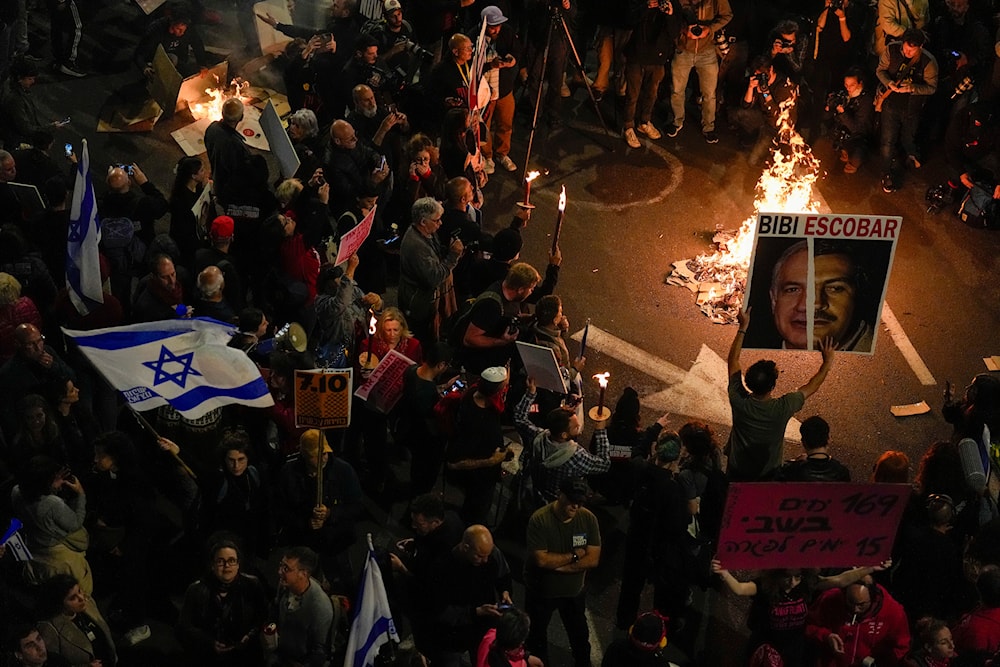Netanyahu obstructing prisoner exchange talks: Ynet
The Israeli occupation is turning against Netanyahu as he gets blamed for obstructing the prisoner swap talks with Hamas.
-

Demonstrators block a road during a protest against Israeli Prime Minister Benjamin Netanyahu's government and call for the release of captives held in the Gaza Strip, in 'Tel Aviv', occupied Palestine, March 23, 2024 (AP)
The Israeli occupation obstructed the prisoner exchange deal negotiations with Hamas, Israeli media outlets said, noting that Israeli captives were paying the price with their lives as time went on.
"On Friday, after the cabinet approved in principle the dispatch of the negotiating team to Doha, the discussion ended before all the ministers could express themselves due to the Shabbat," Israeli newspaper Yedioth Ahronoth reported.
"More importantly, the cabinet did not define the scope and depth of the negotiating team's powers, or in other words, what the team members were allowed to concede, and what they must continue to insist on," Ynet added, noting, "In this case, there was no point in the team going to Qatar at all."
The website pointed out that Israeli Prime Minister Benjamin Netanyahu "insisted on a series of initial demands from Hamas and did not respond to suggestions from some members of the negotiating delegation to take action."
"In this case, in this government, there is no oversight to ensure that the issue of the captives is always at the top of the priorities. We gave up spirit and humanity a long time ago," the newspaper quoted a source familiar with the matter as saying.
Poor decision-making
According to the website, several senior government and military officials have strongly criticized the decision-making process in both the War Cabinet and the regular one, and even that of the Prime Minister, regarding the prisoner exchange talks.
The main criticism stems from the contents of the prisoner swap deal and its ranking among the cabinet's priorities, among other factors, but above all, the "exhausting slowness" it is taking to be dealt with. This is accompanied by allegations that the prime minister is obstructing the process on purpose.
"One must understand that the negotiations this time are not like those that led to the [Gilad] Shalit deal," Ynet said, explaining that "at that time, Israeli representatives were sitting in Cairo, and in neighboring rooms, and sometimes on the other side of the wall, Hamas representatives were sitting there."
"In every proposal, every problem, and every counter-proposal, within the framework of the so-called convergence talks, within minutes, and sometimes seconds, it was possible to end things quickly," it added.
Currently, the ongoing negotiations are about several captives whose lives are in constant danger, the website said, "In the face of the tremendous time pressure, every day that passes for the prisoners - even if they were not killed by an Israeli army bomb - they are living by the sword."
According to the report, other senior officials believe that Prime Minister Netanyahu is deliberately trying to sabotage the deal, while the more lenient ones believe Netanyahu when he says that this is a tactic to show that the occupation has the upper hand in order to get Hamas to make concessions in the negotiations.
A senior official familiar with the negotiations says it is about "the Israeli government's distraction and misleading of the Israeli media and public opinion as if it was doing everything to get the captives' issue done and over with as quickly as possible."
Netanyahu's growing unpopularity
Protests against Israeli Prime Minister Benjamin Netanyahu and his government members renewed Saturday evening, demanding his departure and reaching an urgent prisoner exchange deal with the Palestinian Resistance, as well as holding early elections.
Talks over a ceasefire in Gaza and possible exchange of prisoners between the Palestinian Resistance and "Israel" resumed in Doha this week, with "Israel's" spy chief David Barnea joining Egyptian, Qatari, and US mediators.
Thousands participated in two large demonstrations, the first of which demanded elections and the overthrow of Netanyahu's government on "Kaplan" Street, where some protesters closed off Route 2 in the area.
The second demonstration, near the Israeli Ministry of Security headquarters in "Tel Aviv", called for a swift deal to release Israeli captives held by the Palestinian Resistance in the besieged Gaza Strip.
Clashes erupted between Israeli police and settlers, where police threatened to impose hefty fines on any protesters attempting to block "Ayalon" Street but to no avail.
In both occupied Qaysaria and Haifa, hundreds of Israeli settlers participated in massive marches calling for a change in government. Some protesters held signs reading, "The Israeli government is against the Israeli people."
Touching on the protests, Israeli opposition leader Yair Lapid told the Israeli Channel 13 that "Israel" has a "terrifying government", emphasizing the necessity of holding early elections.

 5 Min Read
5 Min Read








